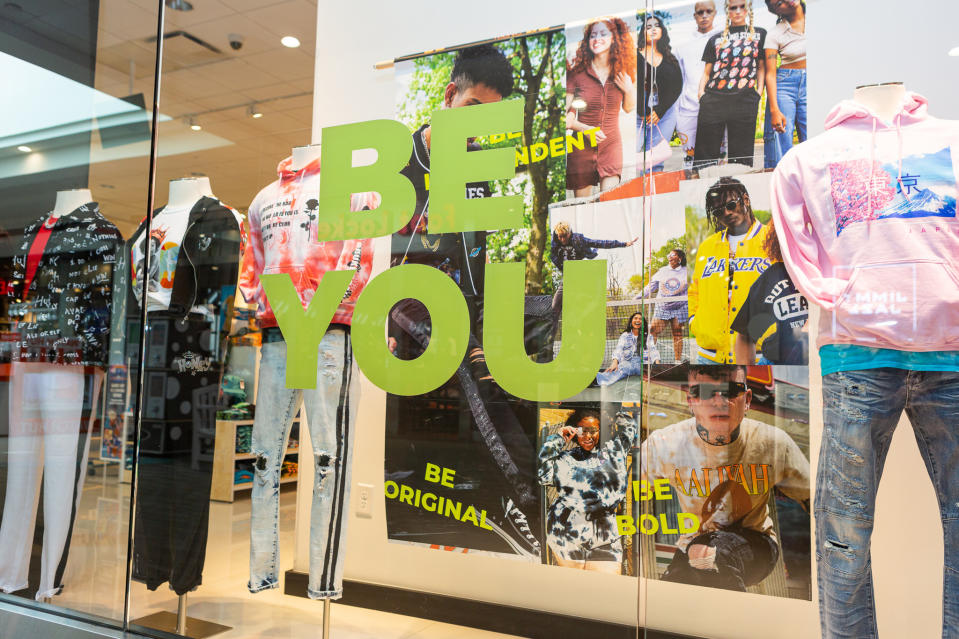Rue21 Sets a ‘Risk-free’ Return to Store Openings

At Rue21, the pace of store openings is picking up but the strategy remains disciplined.
“Over the next three weeks we’ll open five stores before students head back to classrooms, and a total of 15 by the end of the year,” said Bill Brand, Rue21’s chief executive officer. “And next year, we’re going to open at least 20, and about half of those are already committed.
More from WWD
“It’s really a very disciplined approach. We’re not taking on risk,” Brand told WWD. The brick-and-mortar strategy, he stressed, has a data-driven site selection process that’s “laser-focused” on selecting real estate that fits Rue21’s customer profile and targeted demographics — the 15-to-25-year-old Gen Z customer, multicultural, with family incomes of $50,000 to $80,000.
“Rue21’s marriage of data and customer recognition provides the perfect formula for a winning location,” added Michele Pascoe, Rue21’s chief financial officer who also oversees the real estate strategy. “The success of the new stores in 2020 fueled investment in the 15 new stores this year.”
To further help keep retail expansion on the right track, field teams participate by visiting every site prior to a new location approval. Also, the company works with A&G Real Estate Partners on site selection and landlord negotiations. The average store size is 5,000 square feet.
Currently, the Warrendale, Pa.-based specialty retailer operates 652 brick-and-mortar locations in 45 states and rue21.com and sells affordable, “on-trend” private-label fashion including lots of jeans, jeggings, sweaters and hoodies, in regular and plus sizes, with much of the assortment in the $20 to $40 range.


Courtesy Photo
In its headiest days, Rue21 grew to 1,200 stores but got into trouble with the overexpansion and other issues like insufficient marketing and technology and too much debt. The company survived two bankruptcies, leading to hundreds of store closings.
Apax Partners bought the company out of its first bankruptcy for $1.1 billion, put $800 million in debt on the books, and sold the business to hedge funds BlueMountain Capital Management, Southpaw Asset Management and Pentwater Capital Management in September 2017 to get the company out of its second bankruptcy.
Asked if he sees a cap on the size of the Rue21 store fleet, Brand replied, “We don’t need a thousand stores. We’ll be happy in the low 700s. That is a good healthy amount of stores…We may close some low-volume stores as leases expire, but 100 percent of our stores are profitable. A store might have more upside if it’s relocated.”
As many retailers were closing stores during the pandemic, Rue21 opened three units last year that the company said outperformed expectations by more than 50 percent, encouraging further openings. “One of the biggest surprises to me since I’ve been at Rue21 is the power of our stores. People love shopping our stores,” said Brand, who joined Rue21 in October 2020, after serving as chief retail officer of Carnival Corp. cruise ships and earlier president of HSN. “Stores are our most efficient way to acquire customers.”
With the store strategy, “We’re going back into Miami and Los Angeles. The multicultural customer is there at our age level and income. These are proven locations that will work.”

Courtesy Photo

Courtesy Photo
Brand said “there is no shortage of real estate opportunities. There are also some that might be above our price range.”
To operate the stores, the company is “aggressively hiring, but it’s a really tight market,” Brand said. “We still require employees but we haven’t seen an impact on traffic. We have increased wages, created special bonuses and retention incentives. Associates like the energy of our brand and they reflect the customer base. We have a number of [job] opportunities but we’re doing our best to continue to recruit.”
At the same time, Rue21 is looking to increase its e-commerce business. “We’ve historically been 90 percent brick-and-mortar. We should be doubling our e-com penetration over the next two years,” Brand said. “If we can grow e-com to a 20 to 30 percent penetration we are on our way.
“When we bring customers into our stores, we get them into our loyalty program,” Brand said, noting that 5.5 million actively participate in the “Rue Rewards” program, which was launched in April 2020. He said the program focused on converting new, in-store customers to omnichannel customers.
“Now we have identified customers shopping in stores and online. We want to build on that,” Brand said. “I can’t overemphasize the engagement level and energy of our associates. It’s a key component. They’re helping customers with styling and signing them up for the rewards program.” The bulk of those signing up for the program do so while visiting a store, though Brand added there is a good sign-up rate online.
“Loyalty is our secret sauce right now,” said Brand. “We want to build a great enduring brand. You do that by building great relationships with customers. It’s not about building a lot of stores.”
Sign up for WWD's Newsletter. For the latest news, follow us on Twitter, Facebook, and Instagram.


